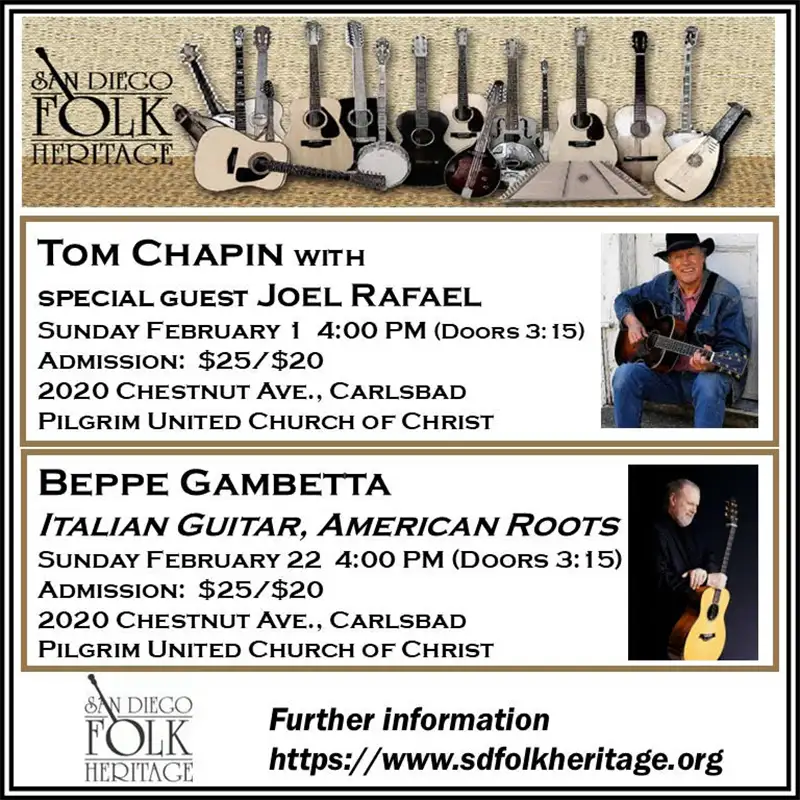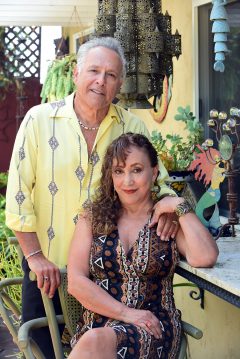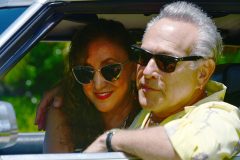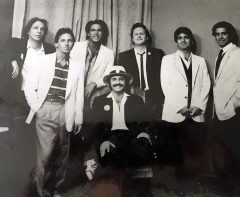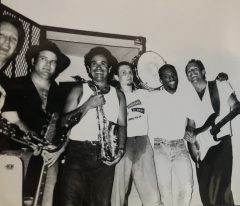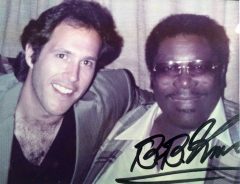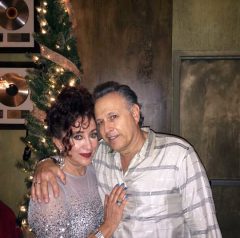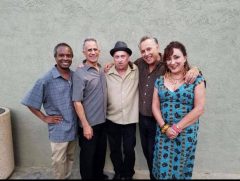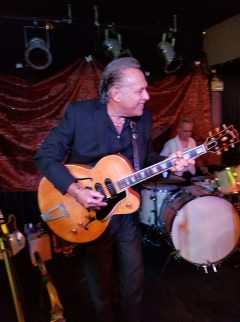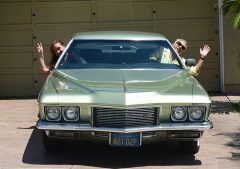Cover Story
Kindness, Love, & Understanding: Blue Largo’s Eric Lieberman & Alicia Aragon Sing Their Own Song
If you’ve followed the music scene in Southern California anytime during the last 40 years, you already know the name Eric Lieberman. If not, you’d certainly know his bands: The King Biscuit Blues Band with Ken Schoppmeyer and Paul Cowie, Tuesdays at Winston’s in Ocean Beach with the Rhumboogies, or every Thursday at Croce’s with the Juke Stompers. Maybe you remember his time alongside Blonde Bruce, back when they used to rip it up at an Irish Pub in Pacific Beach called José Murphy’s. But more likely, you’ve probably come to know him in the last 20 years or so with his band, Blue Largo, featuring wife and vocalist, Alicia Aragon.
It seemed pretty obvious that music came early for Lieberman. “I saw the Beatles on the Ed Sullivan Show in 1964.” Lieberman says, “Guess I was eight years old. The day after that, all of a sudden every teenage kid in America had to have an electric guitar and a rock band in their garage. I guess I was one of those kids.” For singer Alicia Aragon, the approach was closer to home. “My parents sang and we would always sing together,” she says. “I also sang with cousins and a few chorale groups in school, but I was always shy. I used to dream about being a back-up singer because I grew up in the Motown era.”
So many questions—how does a kid from the Jersey Shore (Lieberman) even find a shy singer from San Diego (Aragon) and how does that encounter turn into a lifetime of love and music? As we talked, it turns out to be the road less traveled. A journey filled with the twists of life’s challenges and the turns created by overcoming them. But most of all, it’s a love story.
How did you guys meet? “At the Mandolin Wind,” Alicia says. “Eric was in a band there for a few years.” Eric interjects. “It was the King Biscuit Blues Band.” Alicia continues. “I was a cocktail waitress there in the early ’80s.”
And when did you start playing together as Blue Largo? “In 2000,” Eric says. “Scottie Blinn was playing at the San Diego Blues Festival and he invited us up to perform. In front of 2,000 people! Our first public performance and what did we play, Alicia?”
“Fine and Mellow,” she says.
Your first live performance as Blue Largo was in front of 2,000 people and you performed a Billie Holiday number? There’s nothing quite like trial by fire. Eric smiles when he says, “Alicia killed, man! She’d never sung out front in her life and when she did, it was in front of 2,000 people!”
Before we get too far ahead of ourselves, let’s back up and talk about early musical influences. Eric, what was your first blues experience? “When I was about 15 years old,” He says. “John Mayall was playing at the Monmouth College gym, near my house. That’s the same venue where I first saw Springsteen and the band Steel Mill. And I went to see John Mayall. We go to the show and we get into the auditorium and I see all these old black guys in suits and ties with trumpets and saxophones and it was B.B.’s band and this was about the same time that B.B. was crossing over from the Chitlin’ Circuit to play for college audiences—white audiences. Around that time, ‘The Thrill is Gone’ came out, arguably B.B. at one of his heights.”
How about you, Alicia… you mentioned your parents. Who else influenced your direction? “Yes, my parents loved music, and when I was a child they would always be singing duos of Spanish love songs and folk songs from their beloved Mexico. They were not professionals, but it was rather just a thing they loved to do. They both had beautiful voices and I used to love to hear them sing. When we would go on family outings we would always sing together in the car. I also had chores to do every day and one of them was watering, so I would just sing all the songs of the day whenever I was watering. These are all such fond memories for me. I guess you could say I was fortunate to get the family singing gene.”
Alicia smiles when she says, “As far as my musical influences, I’m all over the place. I was a Motown girl growing up. I loved Marvin Gaye, the Supremes, Martha and the Vandellas, Smokey, the Temptations…all of them! As a young adult I loved jazz, and was really into Nina Simone, Nancy Wilson, Cal Tjader, Mongo Santamaria, and Dave Brubeck. Let’s not forget rhythm and blues, and baby, give me some soul—James Brown, Stevie Wonder, and Jackie Wilson.”
Alicia, I know you’re a San Diego girl, but Eric when did you become bi-coastal and who did you initially connect with when you got here? “I moved to San Diego to go to law school in 1978,” Eric says. “I met a guitar player by the name of Bob Kamoske, aka Bobby Chevrolet. Bob was playing at a local club in Pacific Beach called Jose Murphy’s. Bobby really inspired me to start playing again, and I also remember thinking that after not playing for three years, I might never get back to it if I didn’t do it then and there. Bobby turned me onto B.B. King’s Live at the Regal Theater, Freddy King’s Hideaway, and Chuck Berry’s Greatest Hits. And that started me down the road to becoming a blues player. Bobby was also the guy who introduced me to Steve Wilcox back around 1980, so thanks to him, I go further back with Steve than pretty much anyone else who is part of our blues community today.
https://www.facebook.com/eric.lieberman.77/videos/1921514424652103/
“Shortly after meeting Bobby, I hooked up with a little blues band called the Chicago Shakers with harp player Mark Bukich, Don Levine on bass and drummer Little Cindy Elder, who was the original drummer in the Rhumboogies. Mark turned me onto T-BoneWalker, and I’d say that it was hearing T-Bone, first and foremost, that made me want to dedicate the rest of my life to becoming the most genuine blues guitar player I could be. And I think that falling so deeply in love with T-Bone opened up a whole new mindset for me. I thought it would be worthwhile to dedicate myself to being a guitarist, and not worry about writing songs. It was very liberating!
“From the time I joined King Biscuit in 1981, through all the other bands I’ve had, including the Rhumboogies, the Juke Stompers, and Blue Largo, I continued to focus exclusively on my guitar playing. I never gave any serious thought to songwriting until 2015.”
Let’s talk about Blue Largo and how it came to be? “The derivation of our name Blue Largo has nothing to do with Key Largo or Blue Lagoon or any of that. It comes from a very obscure Bill Doggett song called ‘Blue Largo,’ and on our very first CD Jonny Viau and I recorded ‘Honky Tonk,’ which is Bill Doggett’s song. It’s got one of the most classic, all-time rhythm and blues guitar solos by Billy Butler. So, I’m a huge Bill Doggett and, especially, Billy Butler fan.”
Was it easier to find a vocalist this time around? “Whenever I needed a singer, I knew that Alicia, who had been my girlfriend since 1982, could sing. Ever since I’ve known her she would learn these standards from Dinah Washington or Sarah Vaughan or Billie Holiday records. They’re hard…they’re hard for me to play! But she was always just happy to be a shower singer.”
Alicia suddenly appears; her ears must have been burning. “But Eric asked me many times to play—I still have stage fright—but I wanted to accept the challenge rather than have the regret of not doing it. It’s been a wonderful experience. Up until that time…I love to garden and that’s where I would do all my ‘performances.’” (laughing) “I’d sing to the flowers. So, that’s how I started and, of course, Eric has always tried to encourage me. It’s been good for us as a married couple and has brought a lot of joy. I still have some of that little girl in me that isn’t quite sure.” Eric jumps in, “And what do I tell you to do?” Alicia says, “You always tell me to take it down in the alley.” They both laugh and simultaneously say, “Way down in the alley.”
How do you describe Blue Largo’s music? “It’s vintage blues, jump blues, swing jazz,” Eric says. “I feel like the words never do justice. I reference certain artists—Billie Holiday, Dinah Washington, T-Bone Walker, and Louis Jordan—so the big thing for me is to be true to the era. Back in the ’40s and ’50s it was more of a melting pot. You might have Billie Holiday playing at a club for one week and then Muddy Waters band would come and play that same club the next week, with very much a similar audience. It was really the music from what they called at that time, race music. When you’d go into a fried fish joint in Louisiana or in Chicago in the 1940s and ’50s you’d have Miles Davis, the Nat King Cole Trio, Louis Jordan, Little Walter, and Sonny Boy; they’d all be on the juke box. So, to me, it’s that palette.
“On our first two records I wouldn’t play anything like Magic Sam or Buddy Guy or anything that used a solid body guitar, because I wanted to keep it pre-1955 sounding. I was very conscious and still am, I think. An album has a theme and a concept that runs throughout. Like a book, each song is a chapter and one chapter has to relate to the other. On our last record, the term I like to use to describe it is ‘original vintage rhythm and blues.’ I like the fact that original and vintage are antonyms, opposites. People think, well, ‘how can it be vintage and original? Original means it’s new.’ Of the seven original songs, I wanted them to sound like they just came out of me. A kid from suburban, middle-class, Jewish-Italian New Jersey, who grew up in the 1970s. The way I feel and the way I think in my life experiences, I wanted them to sound like they were written in 2015, which they were.”
Talk a little about how your writing process came to be? “My writing process is inexplicable to me, primarily because there is no process! When I was in my teens and early twenties, I tried to write songs, but nobody seemed to think they were any good, and, to be honest, neither did I. I don’t think I had the life experience to really write good songs at that age, nor was I very well read or interested in philosophy or politics at that point in my life. When I was in college in Gainesville, Florida, I had a band called Mystic Raven from around 1974 through 1976. We played a mix of originals and covers, and I wrote some of the songs for that band. We were big fish in a little pond in Gainesville, and then we went up to New York in the summer of 1976. All seven of us were living in an old, ratty two-bedroom house in Dobbs Ferry, around 20 minutes north of the city, and we learned fast that we were really very little fish in a very big pond! We played a showcase set at the now legendary punk club CBGB in New York City and even got a positive review from Variety magazine. I also think it’s kinda ironic that we played at CBGBs at all, since it was New York’s premier punk club, famous for launching artists such as Patti Smith and the Ramones. We were playing and writing songs in the vein of Van Morrison, Bruce Springsteen, Hot Tuna, and even had some Earth, Wind & Fire and Latin-influenced stuff in our repertoire. After too many disappointments that summer, the band split up, and I pretty much quit playing for the next three years. That was also the time that I got very deep into Jamaican music.”
Blue Largo’s last album was released in October 2018, and it reflects almost a complete one-eighty…with mostly original material. “Yes, for our fourth album, Before the Devil Steals Your Soul, we had 11 original songs. The title track is basically about living your life to the fullest before it’s too late. There is a song called ‘Monrovia,’ which is the only fictional song I’ve ever written. It’s about a love triangle that ends in murder, with kind of a Quentin Tarantino/Ennio Morricone spaghetti western soundtrack vibe. ‘The Long Goodbye’ is dedicated to a close friend of ours who passed away from Alzheimer’s a few years ago,” and ‘I’m Alive’ is about the incredible power of music to make us feel alive and want to live with passion and purpose.”
What changed the mindset from the earlier recordings? “In March 2015, Alicia and I were driving to our gig at Humphrey’s, and she was saying that we needed to record another album or do something to create a little buzz for our band. Since 2006, I’ve been dealing with a neurological condition called Focal Dystonia, which affects the coordination in my right hand, so we hadn’t released a new CD at that point since our Still in Love With You record in 2003. By this time, I thought I could probably play well enough to commit something to tape again, thanks to overdubbing, so we took a stab at it. I just assumed we would follow the same process for finding material that I believed served us very well on our debut album. And that was seeking out the coolest, most obscure vintage blues songs we could find.
“But I jotted down this little thing called ‘Sing Your Own Song’ about a year earlier after seeing Bonnie Raitt. I was very moved by the fact that Bonnie was such a true disciple and proponent of traditional blues, but yet she never tried to be another Sister Rosetta Tharpe or Memphis Minnie, but rather always just let her music come out of her the way it did—100 percent Bonnie Raitt. And I started thinking about how all the artists who have really made a mark did so because of their uniqueness, not because they were trying to sound like someone else, as I’d been doing for the past 30 some odd years.
“So, when Alicia and I decided to try recording another album in 2015, I went back to find this, thinking maybe we could at least have one original song on the record. Upon finding it scrawled out on a yellow legal pad, buried away somewhere in my music room, I couldn’t make heads nor tails of it. I couldn’t figure out any kind of groove or melody for the words, so I quickly abandoned my short-lived idea for an original song. Then, a couple of days later, I went out for a bike ride and out of the blue I started singing ‘Sing your own song, be your own self, or nobody else will care; shout it out loud, shout it out proud for the whole wide world to hear’ and I suddenly realized it was a gospel song. When I came home, I grabbed a guitar and the song wrote itself in 15 minutes or less. To my great surprise, after more than 30 years of not even thinking about writing songs, all these new original songs, ‘Kindness, Love and Understanding,’ ‘Tears of Joy,’ ‘Elevator to the Gallows,’ ‘Prisoner of the Night,’ and ‘Nothin’ to Prove’ just starting coming to me.
“The reason I said there really is no process for my writing is because they all pretty much came the same way that ‘Sing Your Own Song’ did, on a bike ride without any deliberate intention of writing a song. There’s only a thought or an idea and, I guess, what I’d call inspiration—the words and melody—on the bike. Then I’d come home and pick up a guitar, and arrange the chord changes.”
Lieberman’s struggle with Focal Dystonia really took a toll on him. In the liner notes for the album, Sing Your Own Song, you talk about your battle with the illness and actually said it was “good for you.” Can you clarify that just a little? “My whole life I was insecure about the way I played,” Eric says. “And I always wished I sounded like Anson Funderburgh or Kid Ramos or even guys that were younger than me like Nathan James or Robbie Eason. When I saw some of those old Rhumboogies video tapes after dealing with dystonia for years, I think, ‘Wow, I wish I could just play like me again.’ In that respect my dystonia was a great gift, because it made me appreciate the gift of just being able to play, even if I don’t sound like this guy or that guy.”
Who’s in Blue Largo with you and Alicia? “The current band lineup over the past couple of years, since we recorded Before the Devil Steals Your Soul, is Mike Jones, aka Sandalwood on Fender bass, Marcus Bashore on drums, Taryn Donath, aka ‘T-Bird’ on piano, and either Eddie Croft or Dave Castel De Oro on saxophone. I’d also like to give some much deserved credit to Jonny Viau, who has been a musical partner of mine for something like 35 years, and played saxophone on our first three records. There’s also Arthur Kraatz, who played acoustic bass with us for seven years and my dear friend, Nathan James, who recorded, mixed and co-produced both Sing Your Own Song and Devil.
“I will say that with very rare exception, Alicia and I have been so fortunate to have had both great musicians and great people with us all along, who have really made it possible for us to realize our musical vision, and we appreciate all of them more than they know!”
****************************************
I think that the music that I’ve been so steeped in, so studied in and the only music that I’ve ever dedicated myself to and in learning how to play has been blues.
—Eric Lieberman
*************************************
Blue Largo’s original music has always reflected social commentary. In the planet’s current state of pandemic and protest, what’s your take on the world today? “First of all, I appreciate your acknowledgement that our music has reflected social commentary in the past, because that is something we’re very proud of. Love songs are great, but for me personally, the great songs throughout history that have reflected the cultural and political landscape of the time, ‘Blowin’ in the Wind,’ ‘What’s Goin’ On,’ ‘A Change Is Gonna Come,’ ‘Freedom Highway,’ ‘Get Up, Stand Up,’ ‘American Skin (41 Shots),’ and ‘Ain’t Gonna Play Sun City,’ just to name a few. Songs that have the power not only to make us feel but also to think critically, and I believe oftentimes to act. And that is a very powerful and beautiful thing for me.
“As for my take on the world today, especially regarding the pandemic, I believe these are the most extreme and uncertain times that any of us have lived through. None of us have seen the entire world economy shut down for months, nor have we ever witnessed unemployment in our own country that is this high, unless you were alive during the Great Depression of 1929. And, socially speaking, for the first time in our lives, we had to pretty much lock ourselves in our homes, cease all contact with our friends and family, and stop going to restaurants, music venues, and stores—other than grocery stores. And this all happened overnight, which is pretty amazing to me. That being said, I’m glad most people have listened to the scientists and epidemiologists, who I don’t believe have a political agenda, but who were truly trying to give their best guidance to help save lives from this terrible virus. And then, just as the pandemic seemed to be getting a bit more under control and the country started to open back up and revert to a state of more normalcy, we had the horrific and tragic death of George Floyd in Minneapolis, which threw a whole other wrench into the uncertain future of our country.”
Do you see a change coming? “I am an eternal optimist, who ultimately believes in the good of mankind and in the ultimate victory of good over evil in society, so much so that at times I start to think I’m just naïve. But then I see the unity and deep commitment of all races and socioeconomic classes who have come together to protest in support of finally doing what is necessary to change the systemic racism in this country, especially as it has manifested itself in our police departments, but really across the board in every area. I see that Lowe’s is donating $25 million to minority-owned businesses to help them reopen after being forced to shut down due to the pandemic, that NASCAR is banning confederate flags from its races, that police departments across the country are banning choke holds and implementing other measures to help assure that there isn’t yet another George Floyd-type murder, and that cities such as Los Angeles are reallocating their budgets away from such excessive funding for their police and are instead directing these funds into community services such as healthcare, affordable housing, and public transportation, which will especially benefit minority communities. I honestly don’t know where this will all lead to in a year from now, but I do believe there is more of a real reason to be hopeful about addressing systemic racism in our country than I have witnessed at anytime in the past. From Barack Obama to Cornell West, I am hearing that ‘this time seems to be different,’ and I just hope they are proven right.
As far as any positive outcome from the pandemic, I’m a little less optimistic. At first, the country seemed pretty unified in its response, and I wasn’t noticing much of a political divide, regardless of whatever Trump was saying about it. I was thinking that protecting oneself and loved ones from this terrible virus, which was infecting Republicans and Democrats equally, was enough to unite us in our response to it. But, sadly, just three months into it, the pandemic seems to have done the exact opposite and has only exacerbated the division in this country.”
Alicia, how about you? “As for my thinking about the current world situation, I could go on forever about that. I’m very concerned about the sad state of affairs in so many areas: the pandemic, whether our country can ever unite again, whether we can survive Donald Trump, the environment and future of the planet for our kids and grandkids. But I also see reason for hope in the recent protests for racial justice.
“As for the music, I fear it’s going to be a long recovery for the live music scene. But we still hold it dear to our hearts, and Eric‘s been inspired to keep writing new original songs. So we’ll just keep plugging along, because as the song says, ‘it’s what we gotta do!’”
You’ve written about racial inequality in previous recordings and now, a few years later, they seem more relevant than ever. That has to be motivating. What can we expect from the next Blue Largo album? “Well, we wrote a song called ‘Same Race’ in response to the Trayvon Martin, Tamir Rice, Philando Castille, Walter Scott, and Stephon Clarke police shootings, which we recorded for our Before the Devil Steals Your Soul album, released in October 2018. That being said, we have written about seven or eight new songs and were planning to start recording another album by late summer or fall, but now I’m not so sure about that. We even learned five of these new songs with our band and were at least able to perform them at a couple of shows before everything shut down in March. One song is called ‘A World Without Soul,’ which laments the disproportionate focus on technology and consumerism in our world today and pines for a time when music, art, and culture seemed to play a much more significant role in our daily lives.”
Everybody wanna drive the latest model automobile, nobody really cares about the way that you feel, everyone talking ‘bout the newest technology, ain’t nobody talkin’ ‘bout art and philosophy, too many hearts have turned cold, too many doors have slammed closed, and I don’t wanna live in a world…a world without soul.
“Another song is called ‘Rear View Mirror,’ which is about being our age—I’m sixty-four—and realizing that so much of our lives are in the rear view mirror. I think it’s pretty depressing myself, but most people I’ve played it for say they find it to be more of an appreciation for the life Alicia and I have shared, and therefore not depressing at all. Then there is a song called, ‘Disciple of Soul,’ which is my dedication to Steven Van Zandt aka Little Steven and the Disciples of Soul. Reverting back to my comments regarding the power of socially/politically conscious songs to change the world, Steve wrote a song called ‘Ain’t Gonna Play Sun City’ in 1984. It was referring to the Vegas-like resort area in South Africa during the time of Apartheid in that country. Steve also got all the big name artists of the day, including Springsteen, Sting, the Who, the Stones, Elton John, and others to boycott playing Sun City, which I understand ended up costing the South African economy millions and millions of dollars in lost revenues. Now, fast forward to last summer—I was checking out my Facebook newsfeed just before heading out on a bike ride, and I came across a video of an interview Steve was doing on British TV. At one point, the interviewer said to Steve, ‘In a way, one could say that you have been instrumental in freeing Nelson Mandela from prison.’ Steve just kinda chuckled in his own very humble way. I then went out on my bike, and came home with the song!”
They say you freed Mandela with little more than a song, in the fight against apartheid the pen is mightier than the sword, Ain’t Gonna Play Sun City rang out across the globe, yet you say you ain’t nothing but a disciple of soul.
“Musically speaking, this song has a full-on reggae groove, which is completely new for me in terms of my writing and playing style, although I have been in love with Jamaican music as a fan since 1975. We wrote another song called ‘What We Gotta Do,’ which is basically about how real musicians have to play, and it’s not a choice they make.”
It’s a hard road we travel, sure ain’t easy my friend, through all the heartaches and disappointment, we persevere until the end, it’s what we gotta do, we don’t choose, just what we gotta do. And the love and inspiration keeps pullin’ us through.
“And, finally, I wrote a song called ‘Soldier in the Army of Love,’ which is my secular version of the gospel song ‘Soldier in the Army of the Lord.’ And it’s just basically about being on the right side of what is good, right, and just in this world.”
I’m gonna fight against oppression, fight against tyranny, I’ll keep fightin’ for love and compassion, it’s what my heart’s been longin’ to see, ‘cause I’m a soldier in the army of love.
Alicia, what still motivates you as a vocalist? “I think it’s a really healthy and wonderful thing that Eric and I have together,” Alicia says. “I love to sing and Eric brings out the best in me. When we first started this band we were doing rhythm and blues from the 1940s and ’50s, which was great because I’ve always loved the sounds of Billie Holiday, Dinah Washington, and Nat King Cole. If it’s soulful, it’s most likely gonna send me.
“We’ve done that, but now we’re focusing on original songs. And it’s very motivating because I really love the stories. It’s about life, our life, things that are happening right now and trying to be socially conscious. I’m proud of the songs Eric has written.”
Eric adds, “Alicia makes the songs her own, the way she sings them. I don’t really write them with her in mind. I have the blueprint and Alicia turns it into a song the way she sings it.”
“Eric is my kinda’ guy,” Alicia smiles, “When I first met him, before we even dated, I liked everything about him. I fell in love with how kind he was.”
Sounds like a love story to me.




